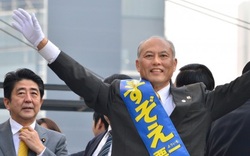 Source: japandailypress.com
Source: japandailypress.com So who is Masuzoe Yoichi, and what does he promise for Tokyo?
Much of the following synopsis of Masuzoe comes by way of the Huffington Post’s Japan page, hence I’ll admit here that this is primarily a translation of that information, interspersed with some observations of my own. Masuzoe (65) is a native of Fukuoka prefecture in Kyushu, who after graduating from the law department of the University of Tokyo, undertook postgraduate work studying international law and politics at the University of Paris. After returning to Tokyo in 1979, Masuzoe was appointed as an assistant professor to his alma mater at the ripe old age of 30.
In 1983, Masuzoe penned a book analysing French politics following the election of Francois Mitterand (under the title ‘Akai Bara wa saita ka?’, or ‘Did the red rose bloom?’). The publisher’s blurb on the rear of the book cover hailed Masuzoe as a ‘new type of international relations scholar’, and a figure to watch in academic circles. However in 1989, Masuzoe left Tōdai to establish his own research institute, dubbed, appropriately enough, the ‘Masuzoe Political and Economic Research Institute’. During the 90s, Masuzoe began to make a series of television appearances, predominantly in the role of a commentator on international relations and global developments*. In 1999, Masuzoe made his first run for the Tokyo governorship as an independent, where he came a respectable third. The same election saw Ishihara Shintarō elected as governor, which gives some idea as to the level of competition Masuzoe was up against.
In 2001 Masuzoe made a pitch for federal politics, standing as an LDP candidate for the Upper House. After being elected, Masuzoe served as backbencher until being appointed as health minister under the first Abe Cabinet in 2007. It was Masuzoe who was responsible for dealing with the so-called ‘vanishing pensions’ scandal that broke out in the same year (a result of flawed administrative practices by the Ministry of Health, Labour and Welfare, which meant that pensions accumulated at one workplace were not rolled over when an employee transferred to a different workplace ). After the LDP lost power in 2009, Masuzoe was vocal in his criticism of the LDP executive (of which Shinzo Abe was a member), and resigned from the party in April of 2010. Masuzoe, with another six former Upper House LDP supporters, then formed the ‘New Reform Party’, an act for which he was punished by the LDP by having his name struck from its list of members (always an after-the-fact move by parties wishing to chastise rogue party members, more a symbolic act than an actual punishment. Incidentally, Masuzoe resigned as leader of the ‘New Reform Party’ in June of 2013 following the party’s failure to increase its membership).
Despite their fractured past, it seems that the LDP/New Komeito, when examining the possible options for the next governor of Tokyo, decided that Masuzoe was the ‘best of a bad lot’ and threw their support behind him. This was the first time a political party had embraced a member whom it had previously punished, and sets a precedent for the LDP that may come in handy in the future (J). Masuzoe will, of course, most likely be governor at the time of the Tokyo Olympics in 2020, and as an election slogan promised to give Tokyo the ‘greatest of all olympics’.
Yet on the question of whether Masuzoe will give his consent to the restart of nuclear reactors that the Abe government has pinpointed as crucial to Japan’s economic recovery, no clear answer has been forthcoming. Bloomberg was reporting on Tuesday that Masuzoe had said that safety at Japan’s nuclear plants needs to be improved rather than shutting all such plants down, and that renewable energy use in Tokyo would be boosted to 20% of all power consumption ($). Yet in a pre-election interview, Masuzoe revealed that he too supported moving away from reliance on nuclear energy, saying…”Tokyo is Japan’s largest consumer of electricity. We are able to enjoy a fruitful life because of electricity…The electricity that we use is made in Niigata and Fukushima. And I am thankful for it. That is precisely why I went to Fukushima after the disaster where, amid such sadness, I thought about what I could do for Fukushima. It was there that I decided that I too would support removing reliance on nuclear energy, and it’s something I’ve continued to talk about ever since” (J video).
The fact that Masuzoe received the support of the LDP will play no small influence on his position regarding nuclear energy, as will the fact that he received so much of the vote ahead of his anti-nuclear opponents Utsunomiya and Hosokawa (although this in part might have been because of the weather, which from all accounts was frightful across the Kanto region on Sunday, leading to a very low voter turnout (J). Mind you, Masuzoe is not creature of the LDP executive, and is more likely to listen to the concerns of industry while advocating a shift to renewable, sustainable energies and placing a priority on disaster prevention and social welfare policies (J). While commentary on the electoral result has focused on Masuzoe as ‘Abe’s man’ in Shinjuku, time may prove such viewpoints to have been a tad premature.
*I am aware, of course, of Masuzoe’s thoughts regarding the suitability of women for high office made during his time as a media commentator. Essentially Masuzoe said that women can’t be leaders because they menstruate and are irrational. Needless to say, this did not go down very well with female voters, who used Twitter to urge a sex boycott for any man who voted in favour of Masuzoe on the weekend. Given the electoral result, I’d say there’s not much lovin’ going on in Tokyo at present.
 RSS Feed
RSS Feed